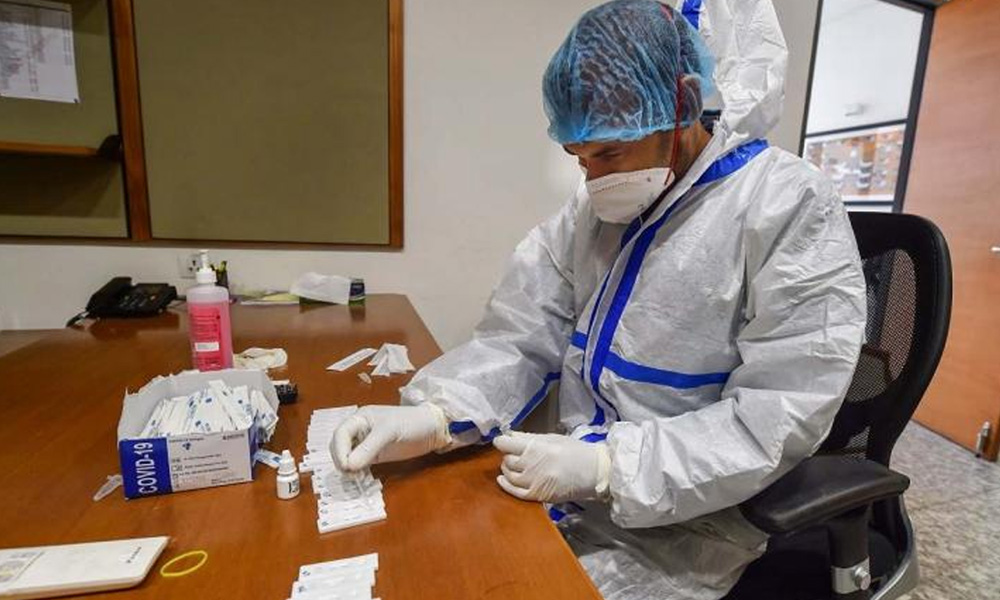
Image Credits: The News Minute
Coronavirus Variants, Absence of COVID-19 Appropriate Behaviour May Be Reasons For Second Wave: Experts
Writer: Ankita Singh
A literature lover who likes delving deeper into a wide range of societal issues and expresses her opinions about the same. Keeps looking for best-read recommendations while enjoying her coffee and tea.
India, 8 April 2021 12:01 PM GMT
Editor : Rakshitha R |
Rakshitha an engineer turned passionate journalist with an inclination for poetry, creative writing, movies, fiction, mountains and seclusion. Not a part of the social process but existential.
Creatives : Abhishek M
" An engineer by profession, Abhishek is the creative producer of the team, graphic designing is his passion and travelling his get away. In more ways than one, he makes the content visually appealing."
Experts said that the immune escape variants of coronavirus are not detected by the immune system. Brazil variant is generally not detected by antibodies.
Laxity in following COVID-19 appropriate behaviour, highly susceptible population and the spread of coronavirus variants could be the main reasons for the second wave of COVID-19 in the country.
The number of new COVID-19 cases in India touched an all-time high since the outbreak of the pandemic, with over 1.15 lakh people testing positive for the virus within the span of 24 hours on Wednesday. This pushed the nationwide tally to 1,28,01,785 cases.
It is for the second time that the single-day rise in cases has crossed the one-lakh mark in three days.
Dr Giridhara R Babu, Professor and Head, Lifecourse Epidemiology, Public Health Foundation of India, said the three important factors can be responsible for the surge of cases, reported The NewsMinute.
Babu said, "Although the government has not acknowledged it as there is no clear evidence. There is definitely a role of new variants of concern which are more infectious, and probably some of them are immune escape variants too, and they are spreading faster than the earlier versions".
He further remarked that the immune escape variants are not detected by the immune system. Some mutations confer this property to the virus and the antibodies are unable to detect it.
He added that the Brazil variant is generally not detected by antibodies. Besides, there is a sub-group of South African variant that is not detected as well.
Babu said, "Most importantly, the pace of vaccination is not as fast as one would expect India to be in. The speed at which the vulnerable have to be covered is not satisfactory."
He also added it is very difficult to specifically say that the variant factor is responsible for the surge in India because genome sequencing has not been done to the expected levels.
Talking about the possibility of re-infection, Babu commented, "There is a role for re-infections, but it has not been studied in detail. As a result, there are a greater number of people who are susceptible."
Babu further said that environmental factors and community behaviour are also playing their part in the spread of the virus.
"Almost everything we do, whether it is rallies, melas, marriage, etc, all these lead to transferring of infection from one person to another. Unless we act on each of these, work on understanding the virus and reducing its geographical area, building host immunity by speeding up vaccination and changing the environmental factors that facilitate faster spread, we can't really expect that the wave will be controlled. Right now, it is surging ahead as a combination of all these may be at play," he said.
Dr NK Arora, an epidemiologist, said that the upsurge is because of "4-5 factors acting simultaneously."
He commented that all viral infections come in a wave, which is a natural phenomenon, and COVID-19 reached its crescendo in September last year. He pointed out that after ebbing, it is again seeing a crest.
As the fear factor which was high in the initial six months of this pandemic has come down significantly, as the economy has opened up, people have started going out and become less careful when it comes to COVID-appropriate behaviour, said Dr NK Arora.
He also noted that mask-wearing has drastically reduced. Commenting upon the question of whether new variants of the coronavirus could be responsible for the surge, Arora said there are several aspects to the issue.
"If we look at variant isolation rate versus the number of cases coming up, it looks like they might be contributing but not a significant proportion of this upsurge is because of the variants," said Dr Arora.
Prof Jayaprakash Muliyil, the former Principal, Christian Medical College, Vellore and the Chairman of the Scientific Advisory Committee of the National Institute of Epidemiology, said that a new susceptible pool has emerged because people are now less anxious about COVID-19.
He added that a new variant that completely ignores the previous immunity acquired due to the infection is a remote possibility, and presently, there is no evidence that it is operating.
Also Read: Karnataka Pollution Control Board Launches Web-Based Application To Track Industrial Waste
 All section
All section














